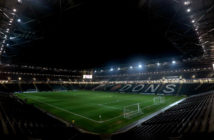Gareth Southgate has led England to a first major final in 55 years and can point to the management of his squad as a key reason for reaching Sunday’s showpiece.
UEFA’s decision to allow managers to name 26 players in their squad rather than the usual 23 afforded coaches the luxury of more options throughout the tournament but it’s not without it’s downsides.
Egos need to be carefully managed with more players being left out. France, as is quite often the case when they suffer an early elimination, have apparently had tensions within the squad yet there has not been so much of a murmur coming out of St. George’s Park.
England, and other big nations for that matter, have been besieged by such issues in the past so it’s a testament to Southgate that he’s been able to build such a positive environment with some likening it to a club atmosphere within the camp.
The strength of the squad and the disparity of Denmark’s was laid bare last night at Wembley as Southgate held fire on his substitutions, only bringing Jack Grealish on in normal time. Bukayo Saka was the one to make way yet he was having a fine game on the right, laying on the assist for the unfortunate Simon Kjaer to turn into his own goal. Any of the England players could have felt hard done by to be replaced.
By contrast, Denmark manager Kasper Hjulmand used all of his allotted five substitutions in the 90 minutes, though some of them were forced.
Andreas Christensen and Thomas Delaney were both forced off through injury in what was a bitter blow for the Danes. Christensen had been having a fine tournament up to that point while Delaney’s experience was sorely missed in extra-time.
Joachim Andersen and Mathias Jensen were the replacements. Jensen played in the Championship with Brentford last season while Andersen was in the heart of a Fulham defence heading in that direction.
It was the triple substitution in the 67th minute that really turned the game and not in a good way from a Danish perspective. Daniel Wass replaced Jens Stryger Larsen who was having a lot less joy down the wing as he had enjoyed in the previous rounds. However, it was the withdrawals of Mikkel Damsgaard and Kasper Dolberg that turned the tide.
Damsgaard had opened the scoring with a stunning free-kick while Dolberg was looking a threat up-front, proving to be a menace to John Stones.
The sight of Yussuf Poulsen warming up led many to believe he could be a not-so-secret weapon off the bench yet the RB Leipzig man was largely on the periphery.
Christian Norgaard entered the fray for Damsgaard, yet the extra solidity in midfield proved inconsequential and on another day he could have given away a penalty after Harry Kane thought he was fouled.
Denmark essentially vanished as an attacking threat, no longer linking the play between midfield and attack with Poulsen and Martin Braithwaite starved of service and support in the final third. This in turn allowed Harry Maguire to become more adventurous and get forward to supplement the England midfield.
England were comfortable from then on while the Danes, despite arguably being fresher having used more substitutes, looked out on their feet. Perhaps the difficulties of the Christian Eriksen situation had caught up with a squad that performed so magnificently in the face of such adversity. How they must have wished to have their talisman to put his foot on the ball and bring some control to proceedings.
So to extra-time, where Denmark had one additional substitution allowed with Southgate holding five in his hand as he looked to put this to bed before the mental anguish of penalties.
Jordan Henderson and Phil Foden were the first called upon, bringing additional energy and creativity against a tiring and retreating defence.
The final England substitution summed things up quite well regarding the squad as a whole. Grealish was replaced by Kieran Trippier despite only coming on as a substitute himself.
While almost certainly privately disappointed, Grealish didn’t let his feelings stop him from joining the celebrations and he will now use this as extra motivation to gain a starting berth in the final.
England avoided the usual jeopardy of dealing with a late onslaught by keeping hold of the ball. A task made much easier owing to the fact that Denmark were playing with ten men as Jensen had gone off injured and Hjulmund had no moves left to make.
Southgate now comes up against another tactician not afraid to use his squad in Roberto Mancini. A similar tale of substitutions could prove decisive in Sunday’s momentous final.
Follow us on Twitter @ProstInt
England
News
![Prost International [PINT]](https://prostinternational.com/wp-content/uploads/2021/08/PINTtFontLogoRoboto1536x78.jpg)


